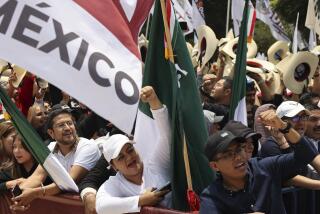Chile’s Senior Officers Set to Tap Pinochet : Dictator Is a Virtually Certain Candidate in Yes-or-No Plebiscite
- Share via
SANTIAGO, Chile — The nation’s foremost senior generals meet today to nominate the sole presidential candidate in a yes-or-no plebiscite in which Chileans will decide whether they want eight more years of rule by the government that toppled their last elected president nearly 15 years ago.
Although Gen. Augusto Pinochet’s nomination is a virtual certainty, an atmosphere of tension and expectation surrounds the announcement. For the first time since the coup led by Pinochet on Sept. 11, 1973, citizens will vote for a presidential candidate--or vote to reject the nominee and thereby begin a process that would partially restore Chile’s traditional democracy.
Pinochet’s supporters plan festive rallies to celebrate the nomination. An array of opposition parties, ranging from center-right to leftist, has called on citizens to bang pots and pans in their homes tonight for a “No” victory in the plebiscite, expected to be held in early October.
Eight-Year Term
A “Yes” victory would give the nominee an eight-year term in office, beginning next March. A No victory would force a multiparty presidential election--with Marxist parties banned by the 1980 constitution--in late 1989. Pinochet would retain the presidency until then, even if he lost this year. He would also stay on as army commander, and the military-dominated National Security Council would retain wide powers under the constitution.
Leaders of the No Command, representing 16 parties, privately have expressed concern over possible street confrontations during the campaign. Such confrontations might frighten voters who recall the tumultuous years from 1970 to 1973 under Marxist President Salvador Allende, who died during the military coup.
Pinochet’s supporters repeatedly have warned that a No victory would bring a return to the chaos and economic hardship of those years, when inflation reached triple digits and shortages, strikes and protests were common.
Both sides are courting the significant percentage of voters who declare themselves undecided in opinion polls. The survey results vary according to the ideology of the pollster, and many Chileans acknowledge that they are reluctant to confide political views to strangers. But the consensus is that the race is very close.
Economic Concerns
The polls also show that the voters’ greatest concerns are economic, especially jobs and housing, and that human rights are a minor issue for most people.
The potential for conflict was underlined Monday afternoon when riot police used water cannon and sprayed tear gas to disperse scores of protesters on a mall in downtown Santiago during a march against the killing, torture and disappearance of hundreds of people during Pinochet’s years in power.
Relatives placed foam figures representing the victims along the mall and against the wall of the Roman Catholic cathedral in the Plaza de Armas. The figures bore the names of the victims and the slogan: “Did you forget me? Yes or No?” Police officers broke up some of the figures while scattering the crowd.
Pinochet, 72, appeared a few hours later at a ceremony in the same square in honor of the late conservative President Jorge Alessandri. By then, the human rights militants had gone home, their places taken by cheering members of National Renovation, a major pro-Pinochet party, and the equally fervent Union of Democratic Independents.
Symbol of Polarization
The unity-conscious Yes campaign received a blow Saturday when the conservative National Party decided to endorse a No vote if Pinochet were nominated, declaring him to be too strong a symbol of the polarization the country has experienced in recent years. The party had favored a civilian nominee who would provoke fewer antagonistic sentiments.
For just that reason, No supporters believe their chances of victory are strongest with Pinochet as the candidate, rather than a more moderate civilian.
The four commanders of the armed forces and the police will nominate the candidate at the Ministry of Defense, in the same room where Pinochet and other junta members suspended the Congress, banished dissidents to a remote island and made other key decisions in the first days after their coup 15 years ago.
Gen. Rodolfo Stange, commander of the national police, will make the nomination.
More to Read
Sign up for Essential California
The most important California stories and recommendations in your inbox every morning.
You may occasionally receive promotional content from the Los Angeles Times.













